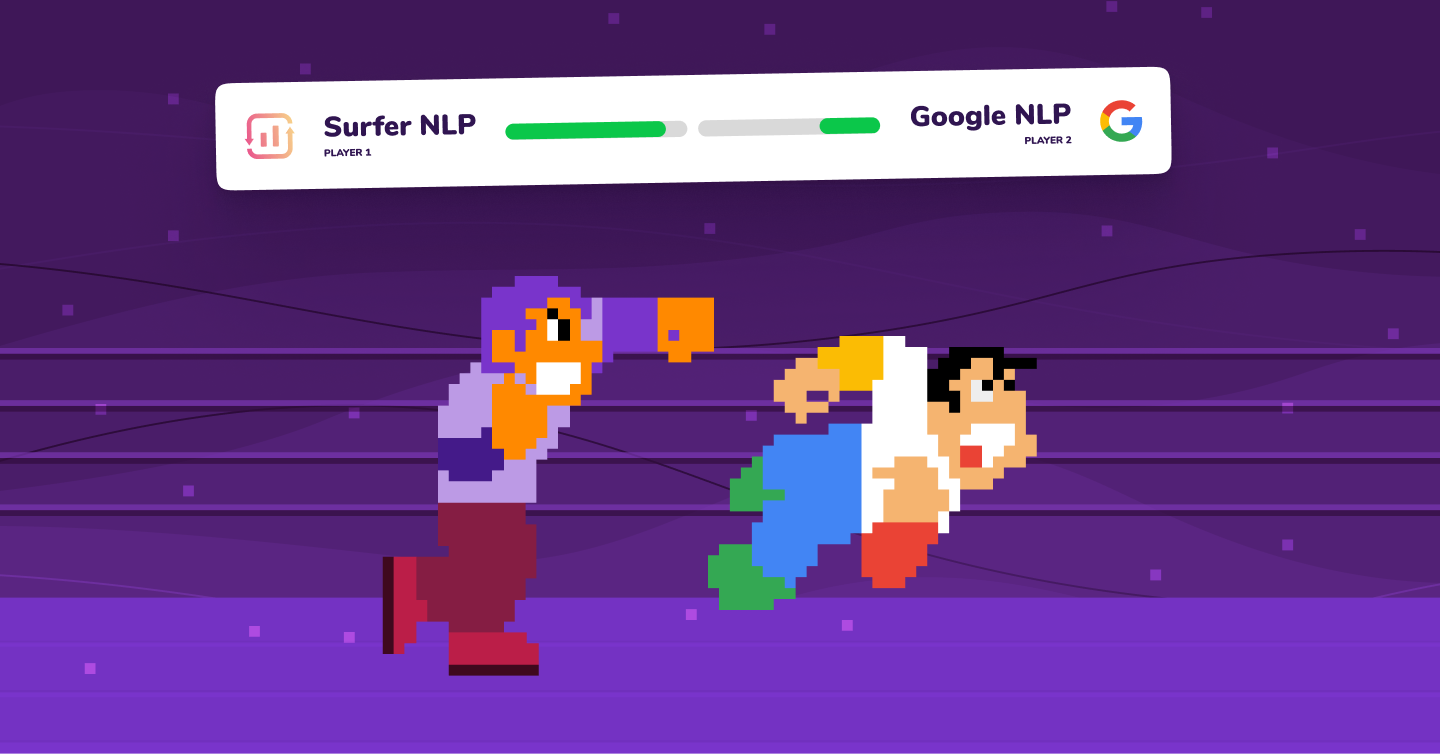
Is there a way to get better quality content guidelines than using Google NLP API?
It took me around 300 cups of coffee to say: affirmative.
Maciek Gruszczyński, Surfer’s data science magician, built our very own NLP engine—and it’s better suited for SEO and content purposes than the Google NLP API.
More descriptive phrases, more relevant suggestions. This is how we want to improve Surfer’s guidelines from ok to outstanding.
Let’s go!
Surfer NLP: the basics
To deliver the content guidelines in your Content Editor, Surfer has relied on the prominent words and phrases algorithm and Google NLP.
And even though many companies were extremely successful with it, the overall quality of recommended phrases was off here and there, with just too many irrelevant suggestions.
If that’s what you observed in your Content Editor guidelines, now there’s an alternative solution: go for Surfer NLP rather than Google NLP when you set up a new Content Editor.
All you have to do is enable the NLP guidelines and click the “Settings” button. You can now choose between Google and Surfer NLPs as the source of your guidelines.

Right now, the Surfer NLP is available in English, Danish, and Polish, but we’ll gradually add the most frequently requested languages.
Is Surfer better at making you rank in Google than Google?!
In a way, yes. And here’s why.
NLP changed SEO in 2020 as it helps Google understand content and its context much, much better. Many SEOs started optimizing pages using the Google NLP API with positive (or very positive results.)
I’m sure you know keyword stuffing is not a viable SEO tactic anymore. Content writers need context, descriptive phrases, and relevant vocabulary in their guidelines. That’s the only way to make sure their content will be top-notch both in the eyes of Google and their audience.
At Surfer, we didn’t want you to continue piecing random phrases together and searching for main themes on your own.
So we put all out effort into NLP research and implementation with a clear goal in mind—delivering the most accurate and effective guidelines for content and SEO.
And I’m glad to say we succeeded.
Google NLP vs. Surfer NLP: comparing guidelines for 10 keywords
What are the core differences between Surfer and Google’s algorithms?
I prepared a few comparisons of the results from both engines.
Sample NLP Analysis
The first example comes from articles about “boiling temperature of the water.” We took a random paragraph of content about the topic and analyzed it with Google NLP API and Surfer NLP.
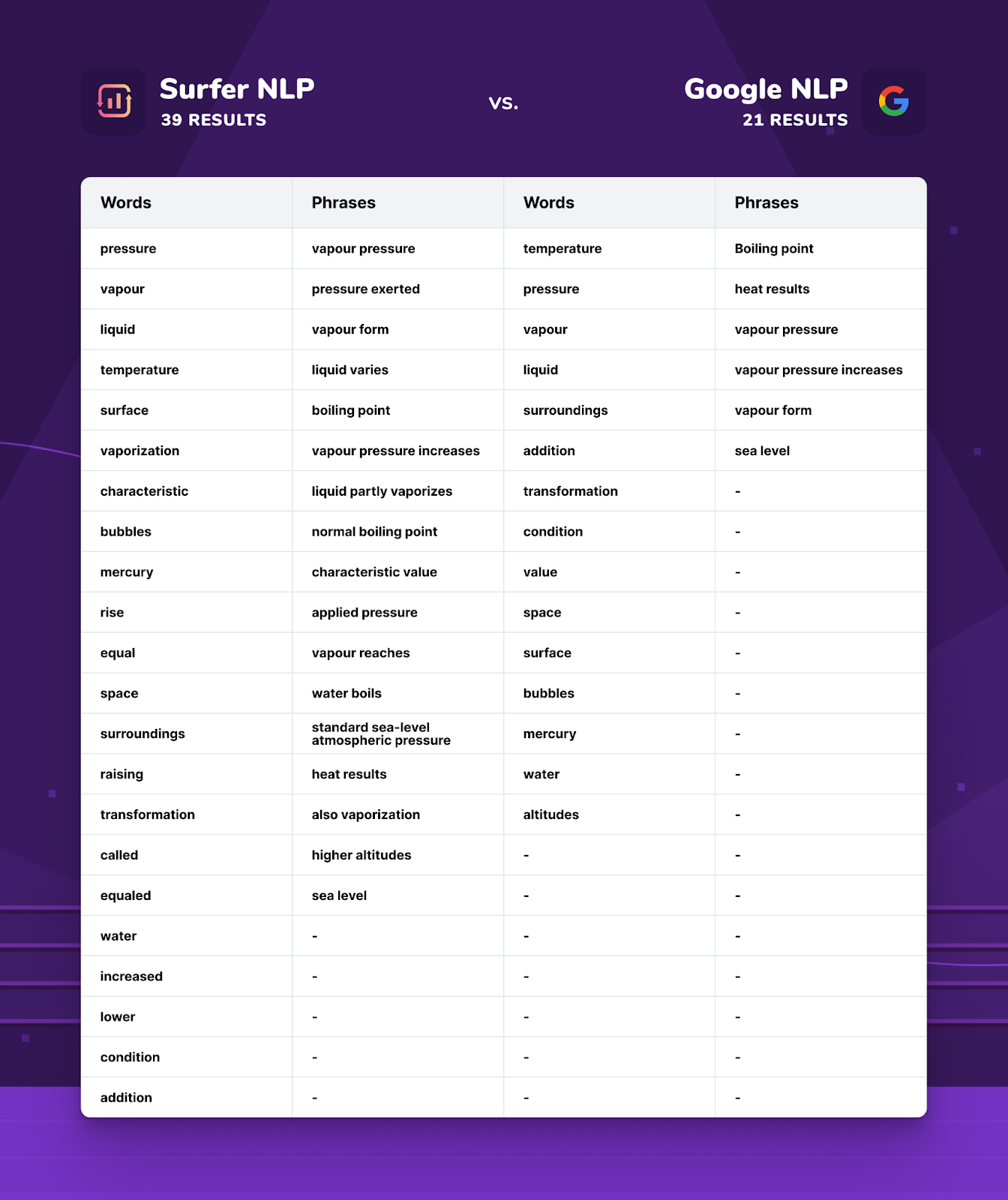
As you can see, Surfer generated 39 words and phrases in total, in comparison to 21 from Google.
But quantity is not the goal here.
Results show that Surfer extracted more meaningful terms as well as longer phrases with greater context. And this is something our beta testers noticed as well:

Now, let's compare the results side-by-side.
Most frequently analyzed keywords in 2020
No surprises here: the most frequently analyzed keywords in Surfer were difficult and highly competitive.
- seo
- online casino
- seo services
- content marketing
- digital marketing agency
- cbd oil
- local seo services
- how to start a blog
- email marketing
- personal injury lawyer
I will examine each keyword one by one, pointing out differences between the suggestions made by Google NLP and Surfer NLP.
The number of recommended terms is the same in both algorithms, and I created both analyses at the same time.
What I learned: the TL;DR
- The terms recommended by Surfer appear to be more related to the topic. Google provides more seemingly random phrases that are hard to find context for.
- Surfer NLP provides more phrases than Google, which emphasizes single words. Thanks to that, we can quickly discover the full context of words and the overarching themes.
- The recommendations do not overlap a lot. Why? Google assigns a lot of salience to single words. But we know that the phrases are what differentiates one piece of content from the other, and what matters for rankings. That’s why Surfer NLP gives phrases a higher relevance.
Keyword #1: SEO
SEO, site, Google, resource, search engines vs. SEO, search engine optimization, search engine rankings, other search engines, search engine traffic.
These are the top 5 most relevant keywords according to both Google and Surfer NLPs.
But Surfer wins with the level of topical relevance, details, and the way the keywords are ordered (from most to least relevant).
Google NLP has some unique keywords, like “Google” that is missing in Surfer NLP as a standalone keyword but let’s take a look at variations:
- google webmaster guidelines
- google search console
- google search results
- google rankings
- google ads
- google determines
Compare the recommendations side by side:
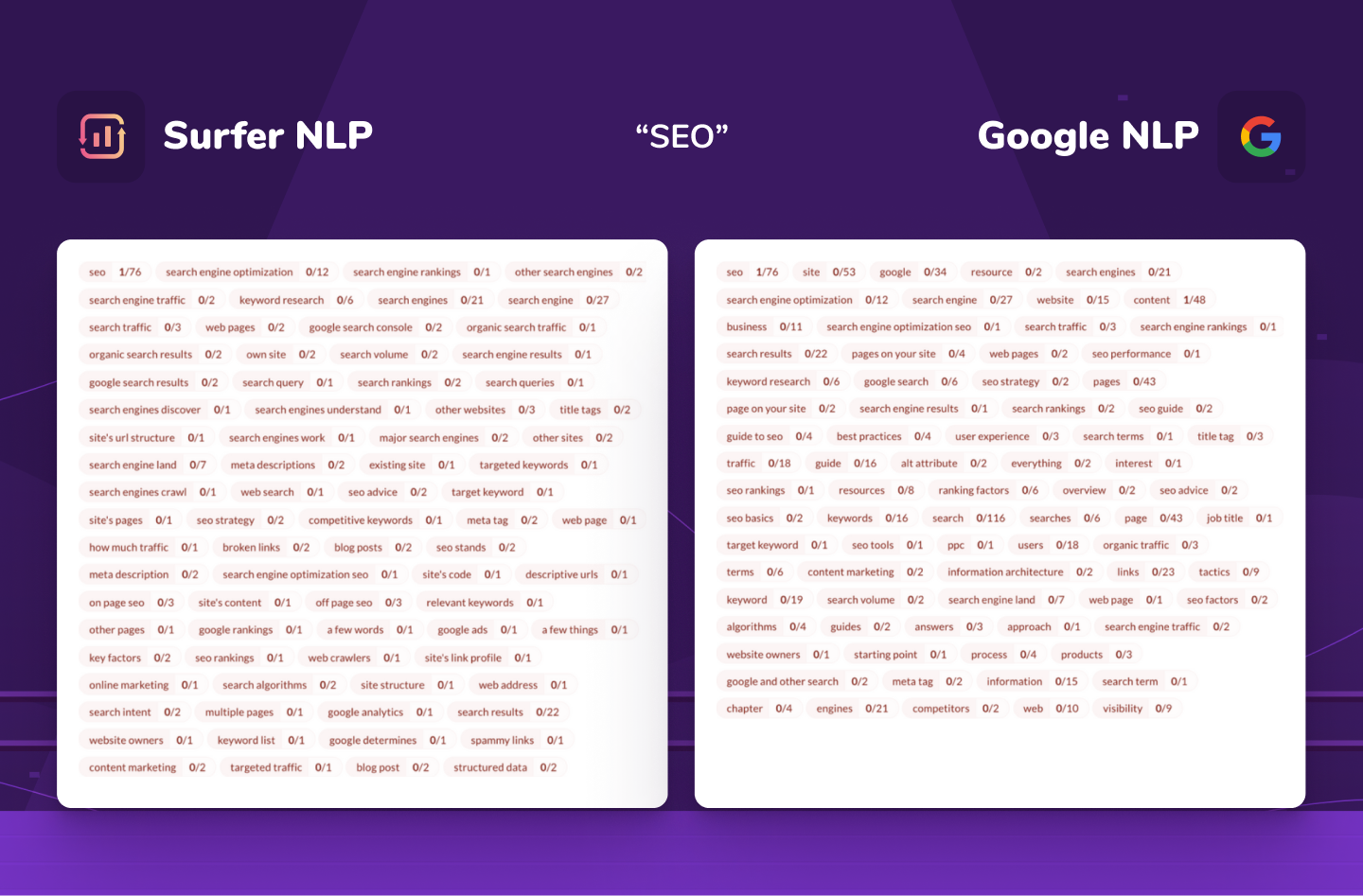
Keyword #2: Online Casino
Let’s have a look at the “Online Casino” keyword.
Here, I emphasized the context in which both query words, “online” and “casino,” appear in the suggested phrases.
Surfer found many more variations and potential uses of these keywords than Google. Their placement is not random, either. They are at the top, which signifies the highest relevance.
As they are both part of the main keyword, we can assume it’s a much better suggestion.
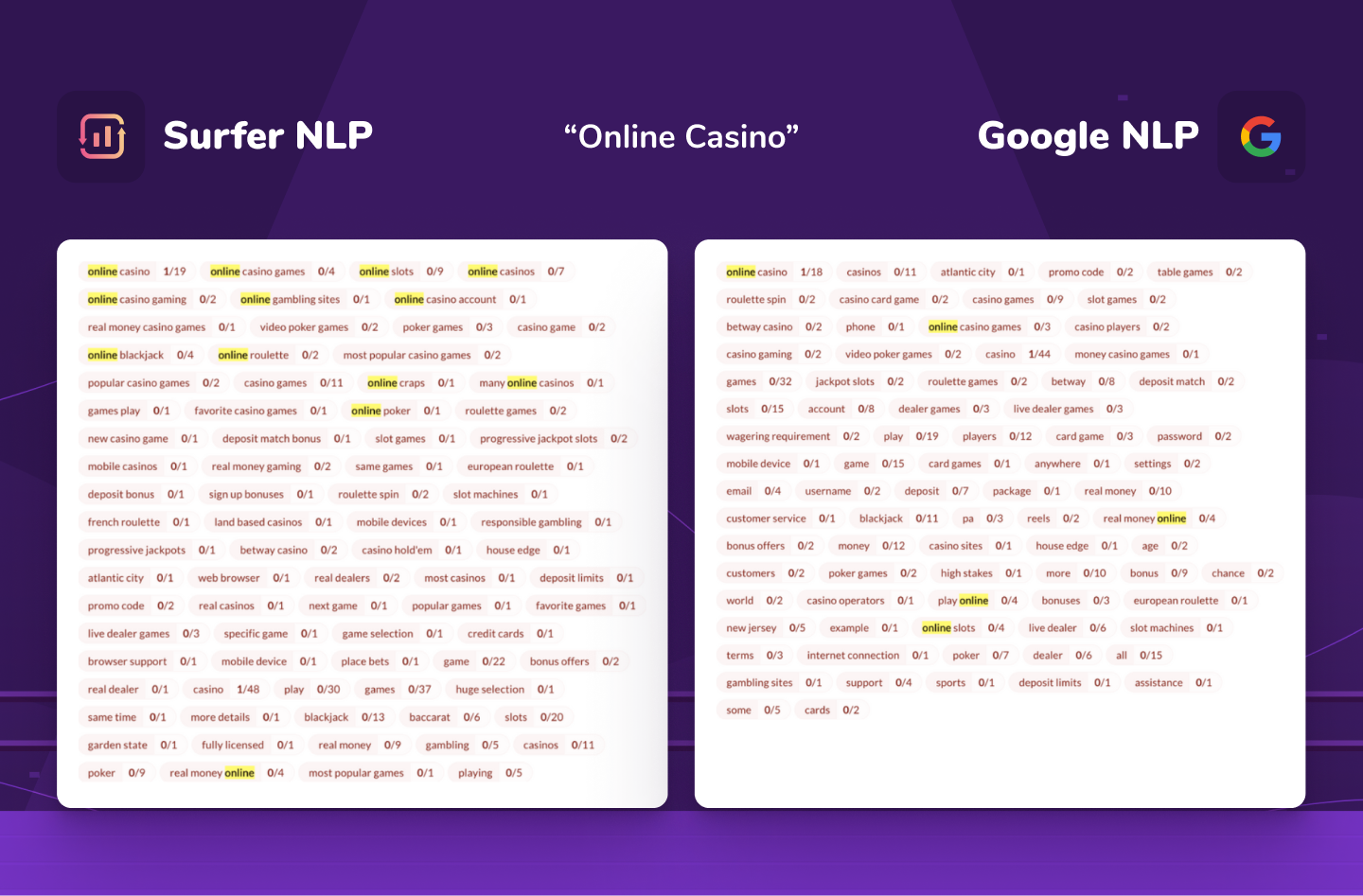
Keyword #3: SEO Services
What about the sheer number of suggestions?
35:22 for Surfer, counting all the variations of “SEO” and “services.” And no fluff, either.
Let the images speak for themselves.
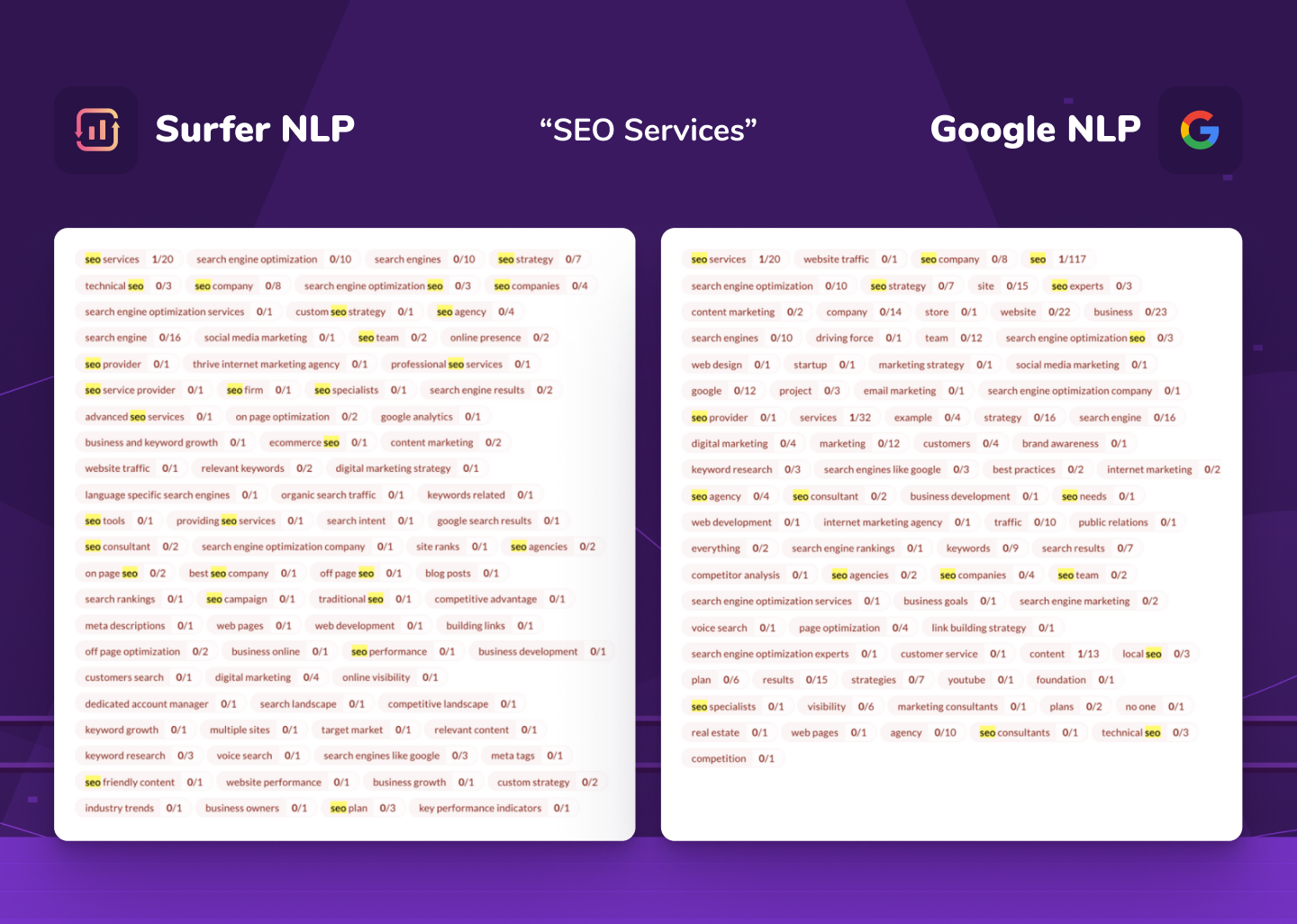
Keyword #4: Content Marketing
This time, I focused on fluff within guidelines. I found two so-so recommendations in Surfer NLP, while Google NLP is full of red highlights.
Surfer also discovered a few golden nuggets that Google failed to include:
- Customer journey
- Clearly defined audience
- High-quality content
- Profitable customer action
And more. The phrases suggest what you should write about, provide a good niche insight, and are ready to put in your text with no modifications.
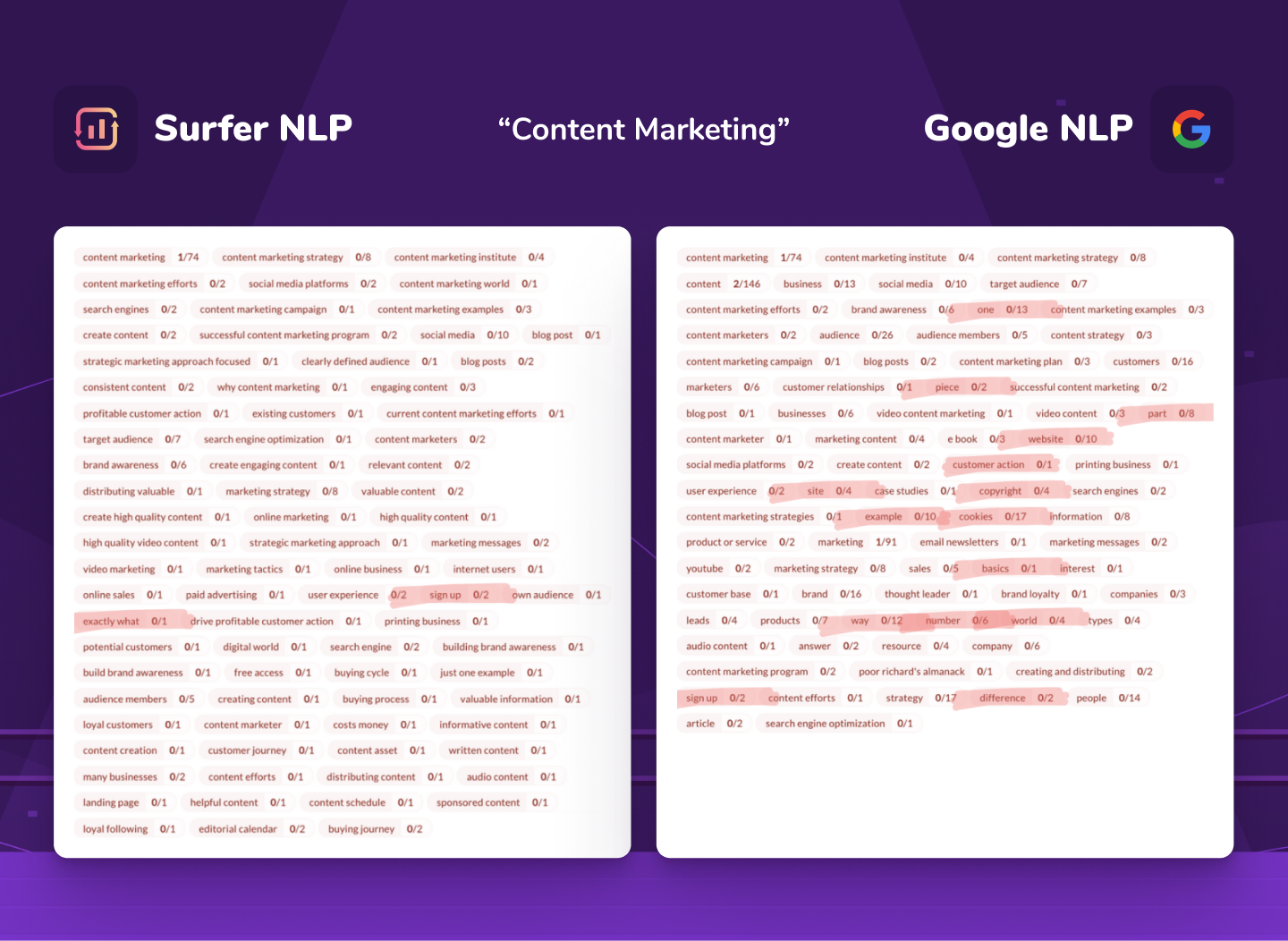
Keyword #5: Digital Marketing Agency
The average length of the recommended word/phrase is as follows:
- 1,85 words or 15,7 characters for Google NLP.
- 2,43 words or 21,4 characters for Surfer NLP.
That’s because Surfer seeks context for every phrase.
Look at the “traffic” keyword example below.
Google NLP has found the “traffic” keyword, but failed to tell us what sort of traffic our audience wants to read about, exactly.
Surfer, on the other hand, informs us that the users mostly want to read about “relevant traffic,” “referral traffic,” or “paid traffic.”
(In the broader set of keywords, I also found “drive traffic” and “organic traffic.”)
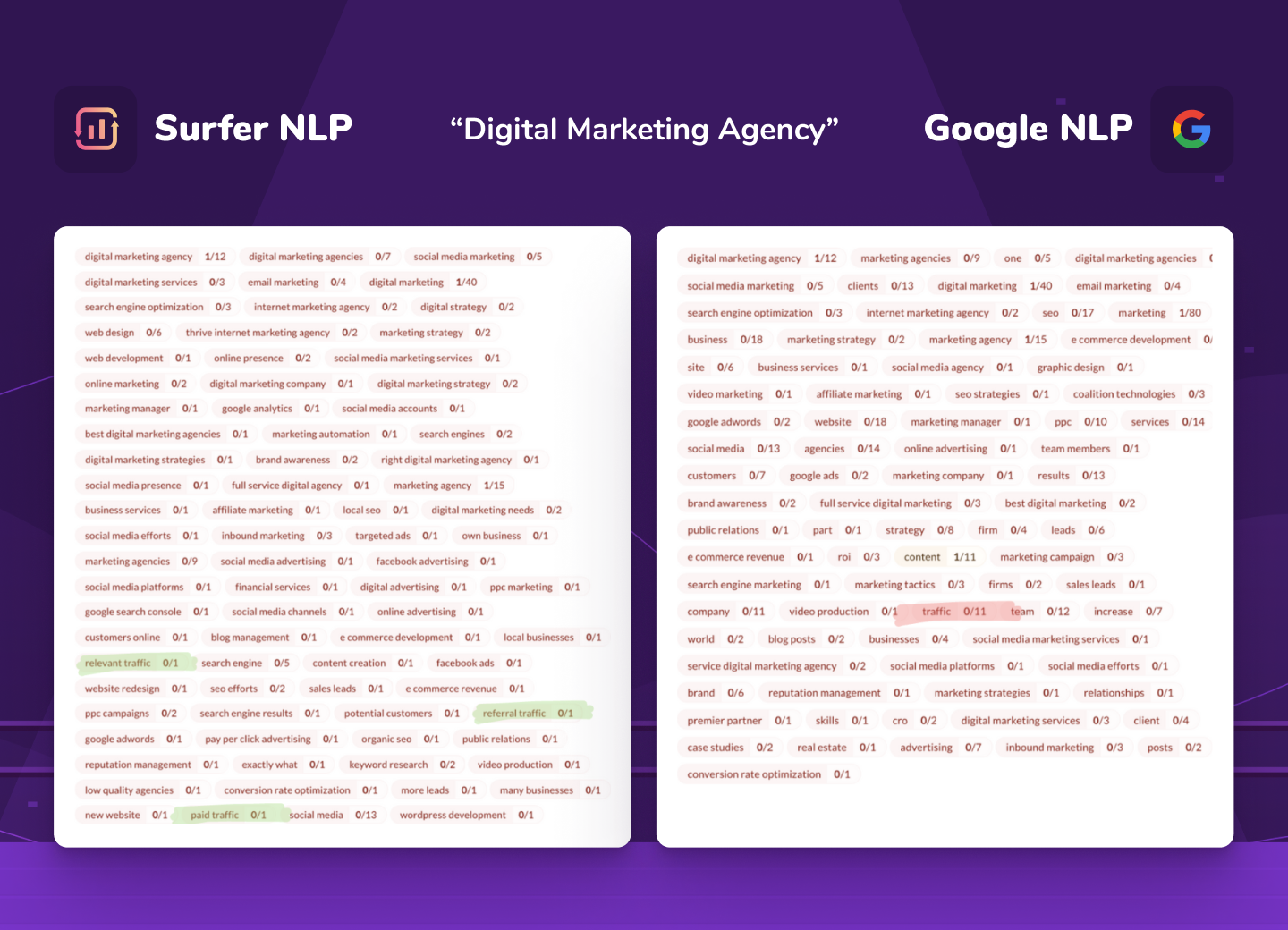
The other 5 most popular keywords
Here’s a side-by-side comparison of the last 5 examples. Check out the results–which NLP engine did better for those keywords?
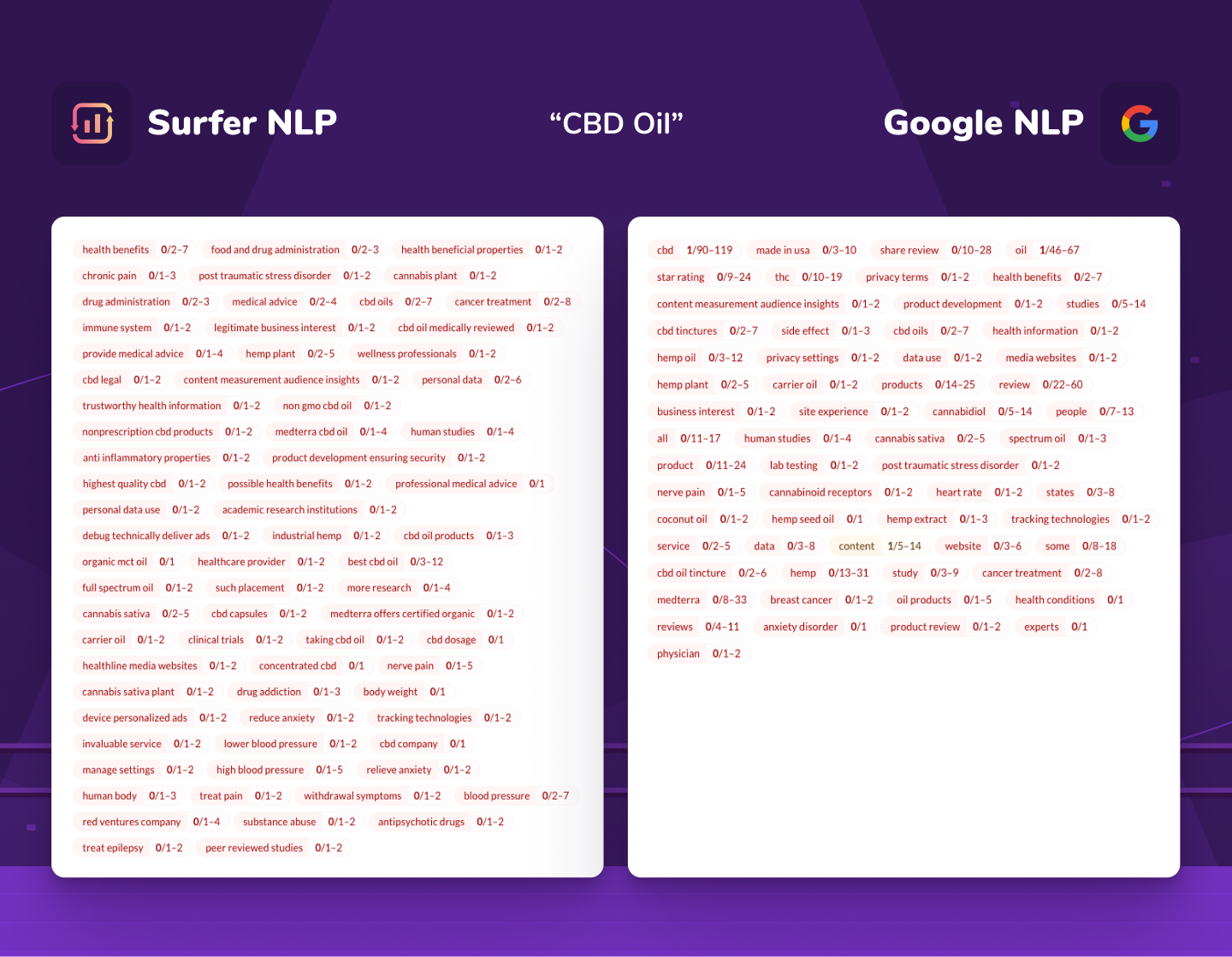
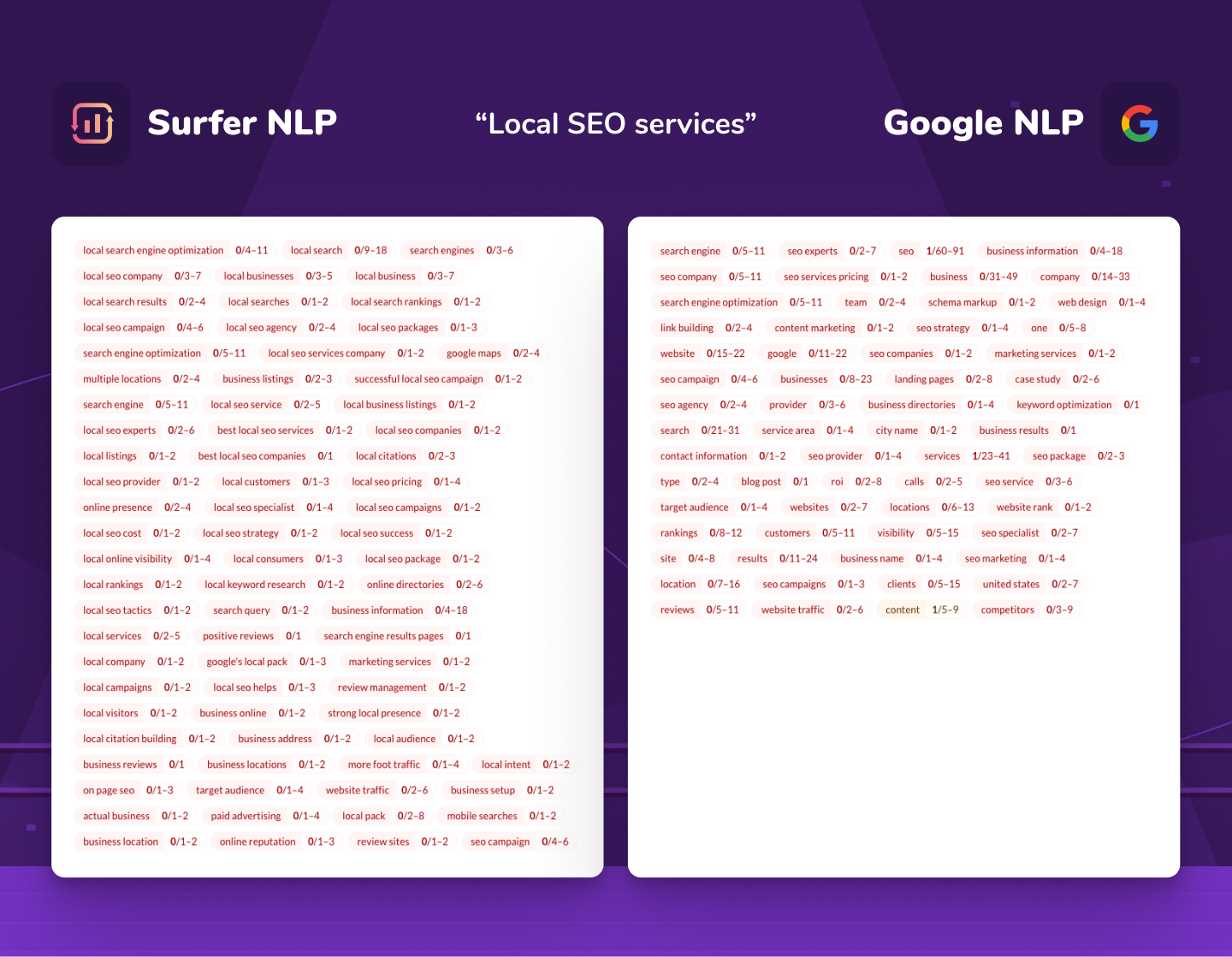
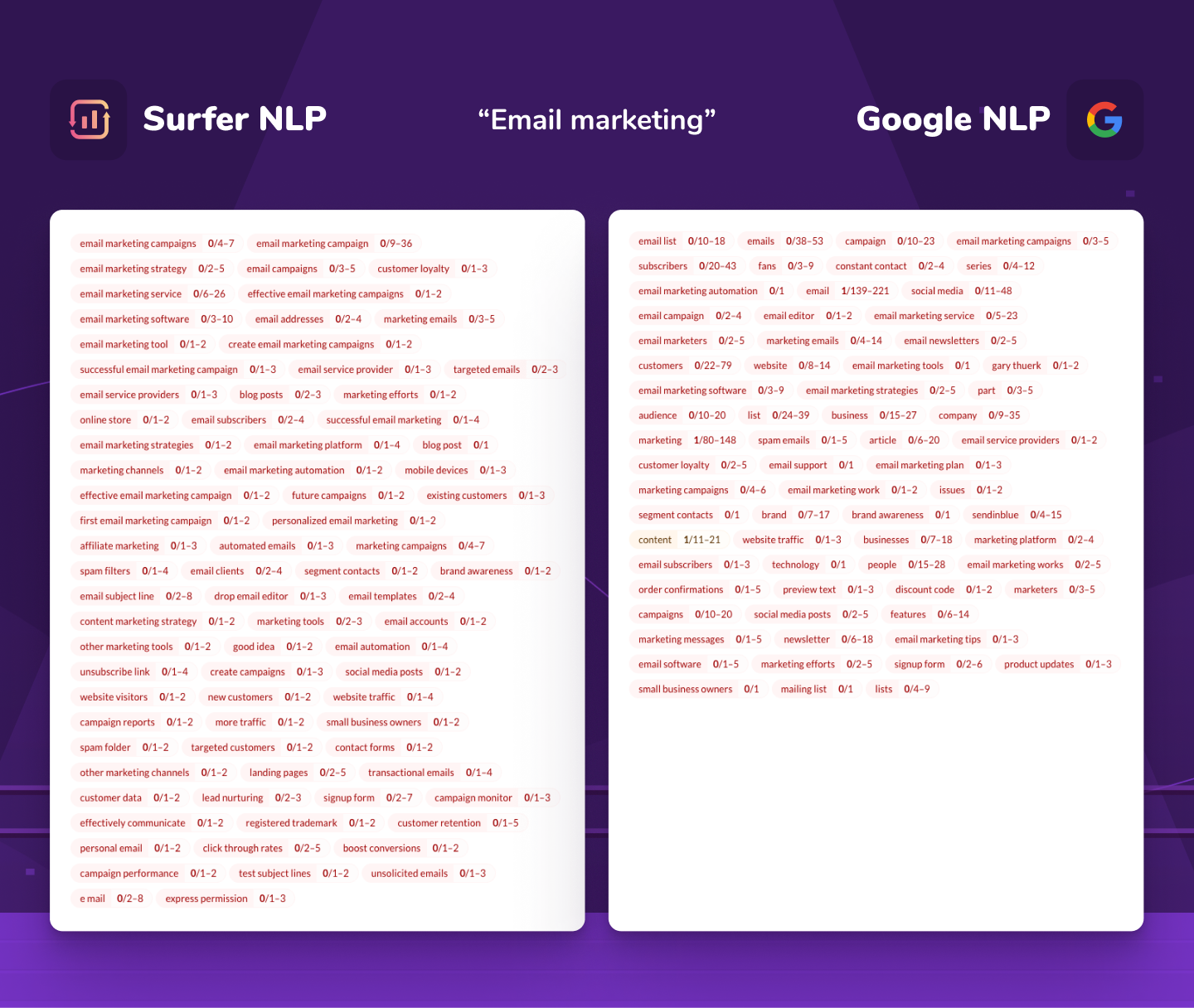
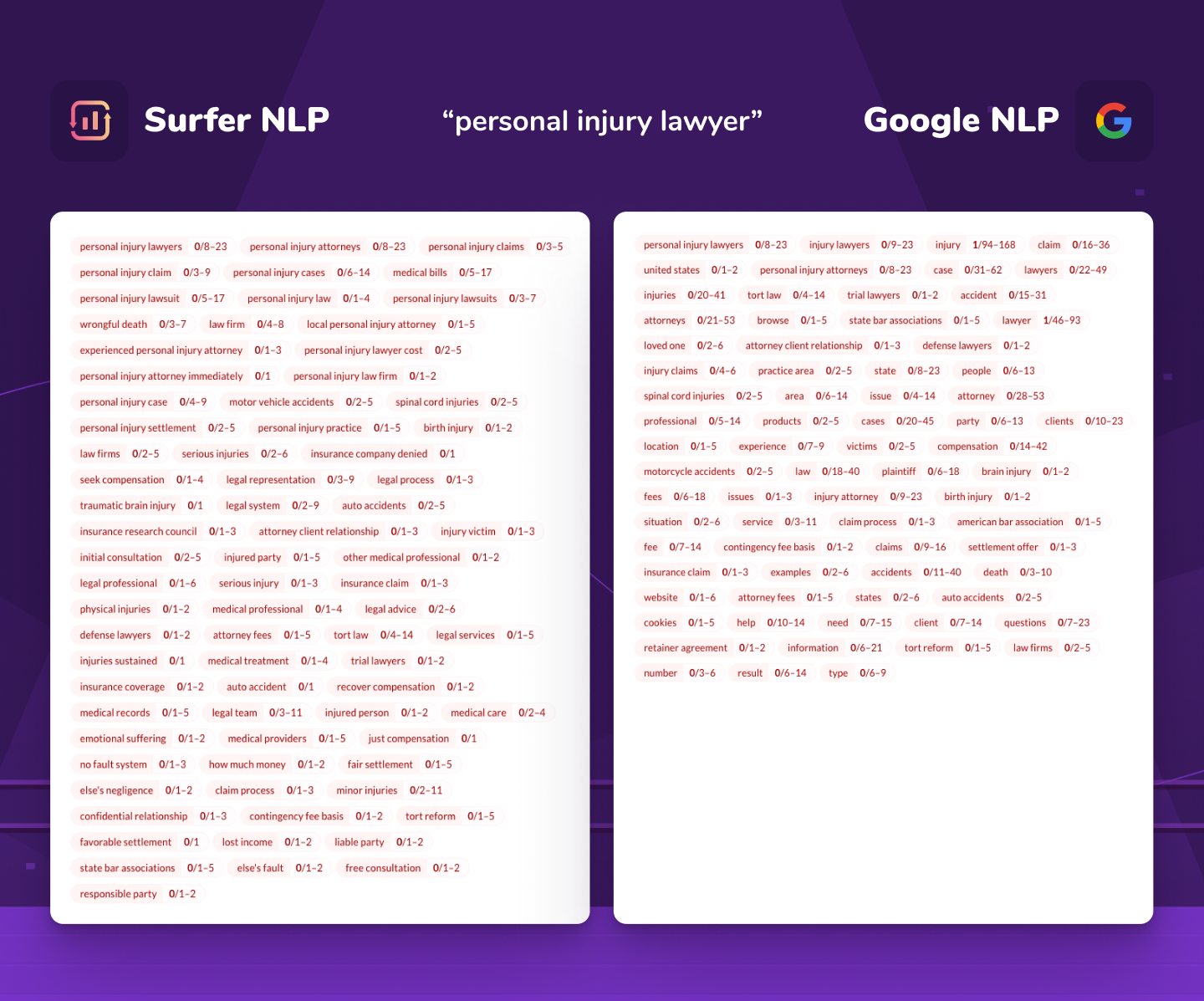
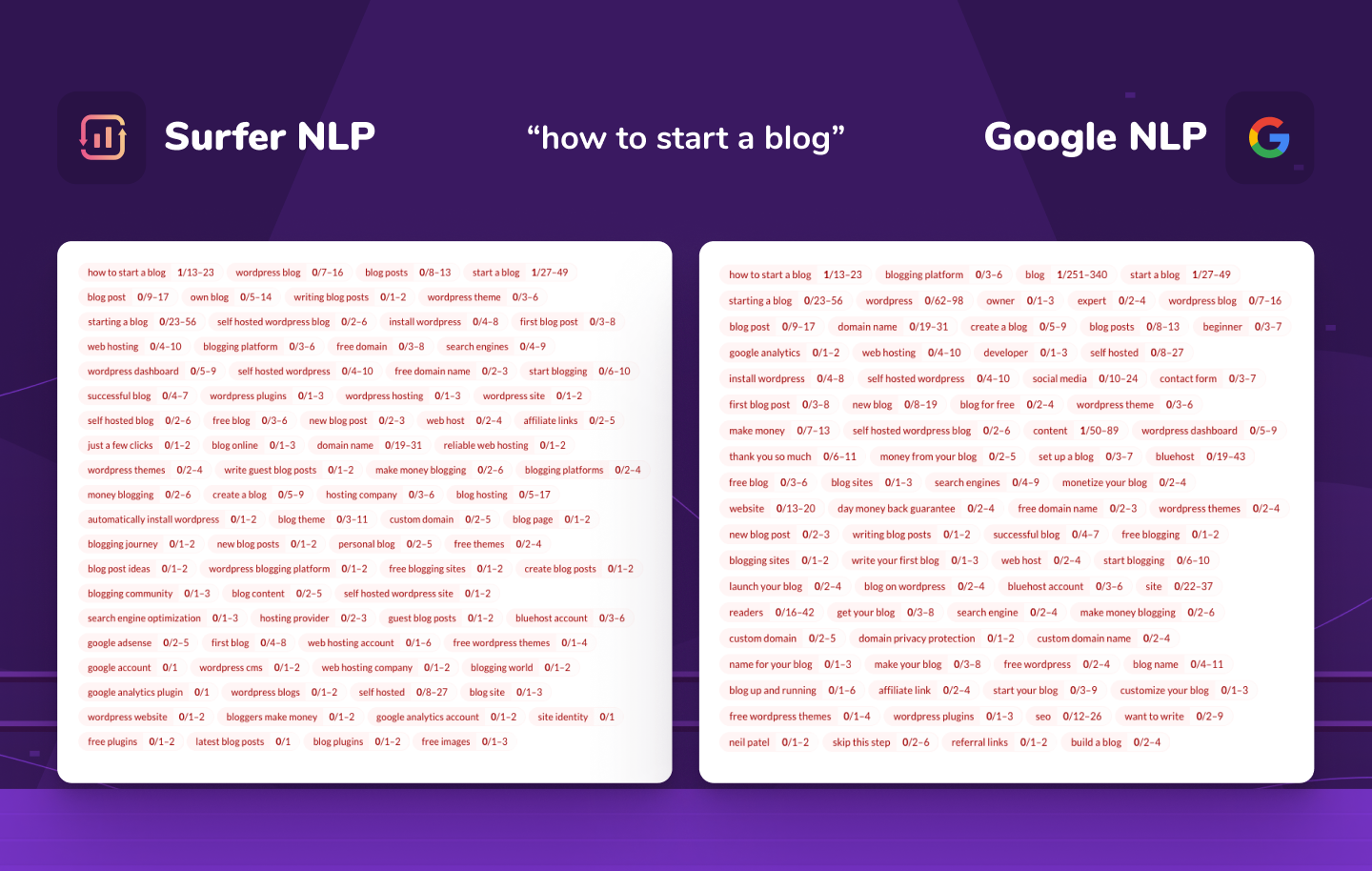
Surfer NLP vs. Google NLP: the most relevant differences
Here’s how Surfer NLP wins over Google NLP in terms of content optimization:
- Surfer is better at sorting phrases from most to least relevant.
- It emphasizes phrases over single words.
- It provides more extended suggestions with much more context. There are multiple variations of the same keyword (e.g., “organic traffic,” “referral traffic,” and “paid traffic” instead of just “traffic”).
- The sheer number of suggested phrases to use is larger.
- Surfer guidelines have much less fluff (words and phrases irrelevant to the topic at hand).
- Surfer discovers more niche-relevant themes and “golden nuggets” that you can use in your text.
Surfer NLP will make writing content quicker & more convenient, and the resulting text will be much more relevant for your audiences and search engines.
Hopefully, now you’re sure that turning on Surfer NLP is a good idea.
Here is the official feedback thread on our insider Facebook group. Join the group if you haven’t already, and let us know what you think!
See other posts:
- The New Algorithm for Content Analysis [Surfer-Exclusive]
- What Is Content Intelligence? Definition and Best Practices Behind a Content Intelligence Strategy
- Keyword Optimization Explained: 7 Effective Tips to Rank Higher

